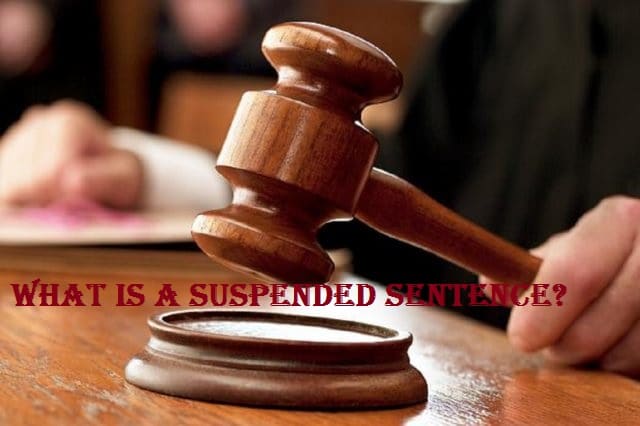A felony is a serious crime that usually attracts severe punishment or a lengthy prison sentence. The fact, however, is that all felonies cannot be assessed or viewed as similarly weighted offenses. The severity of felonies differ and their impact can be very different. Hence, the punishment for minor felonies and first offenses may be seen as too severe.
For example, class E felonies which are regarded as the least serious felonies attract 1-4 year jail terms. Imprisoning all the individuals with a Class E felony burdens the United States government financially and may also be too harsh a punishment for the offenses. For this reason, some judges may choose to suspend the sentence for a period.
In this article, we will explain what a ‘suspended sentence’ means. The types of suspended sentences will also be explained. Lastly, we will list everything you should know about being granted a suspended sentence.
What is a suspended sentence for Felony?

The suspended sentence for felony refers to a situation whereby the defendant is convicted and sentenced by the judge. Then, the sentence is suspended for a stated period. During the period of suspension, the offender will be on probation and will have to adhere to the terms of their probation. At the end of the probationary period, the offender’s sentence will be dropped.
Significantly, the judge may also choose to suspend sentencing before stating what the defendant’s sentence will be.
There are 2 types of a suspended sentence. They are:
1. Unconditional suspended sentence
In this case, after the judge suspends the sentence, the defendant is not on probation. Furthermore, the defendant is not obligated to fulfill any terms of probation. After sentencing has been suspended unconditionally, the court is no longer involved.
2. Conditional suspended sentence
A conditional suspended sentence can be likened to being on probation or parole. When the judge suspends a sentence, the defendant will be on probation for a stated period. During the period of probation, the defendant will need to meet the conditions required. At the end of the probationary period, the sentence will be discharged without the defendant going to prison.
If the defendant fails to meet the court-ordered requirements, the judge can penalize the defendant again. Consequently, the judge could revoke the suspended sentence.
There are a few factors that will determine if the defendant is eligible for a suspended sentence. These factors are:
– The severity of the felony that was committed
– The criminal history of the defendant
– The risk to the individuals in the community if the defendant is released
– Did the action of the defendant put lives at risk?
These factors will also determine if you are eligible to request for an unconditional or conditional suspended sentence.
Everything you should know about a suspended sentence for Felony

1. A suspended sentence is still a conviction
If a judge suspends your sentence, it does not mean that you have been found innocent. Rather, you have been found guilty but you are being allowed to serve your punishment outside a prison.
Even if you have an unconditional suspended sentence, the conviction will be present on your criminal record. Therefore, when you are applying for a job or housing, you should disclose the fact that you have a criminal record.
2. You will have a probation officer
If you have a conditional suspended sentence, a probation officer will be assigned to you. The officer will monitor your activities, and ensure that you are adhering to the terms of your probation. You will be required to check in with the probation officer periodically. Your probation officer will provide reports on you to the judge or court periodically.
3. Your application for a suspended sentence can be rejected
If your lawyer appeals for a suspended sentence, it may be granted. However, the appeal can also be rejected. A history of prior offenses will reduce your chances of being granted a suspended sentence. The prior offenses will make you seem problematic and unwilling to abide by the rules of society.
4. Some felonies make you ineligible to appeal for a suspended sentence
Even if you have no prior criminal record, the severity of the felony committed will determine if you can request for a suspended sentence. This is because some felony convictions have a mandatory prison sentence. For example, murder, possession, and use of weapons or assault are serious offenses. It would be a travesty to grant the defendant a suspended sentence.
5. If you violate the conditions of probation before the probationary period is over, you may have to serve the suspended sentence.
Violating conditions of your probation may attract a warning, longer periods of probation and eventually, the revocation of the suspended sentence.
6. You will need to pay for expenses attached to the probation
During the period where you are on probation, you may be asked to take random drug tests. You may also be ordered to attend counseling or therapy sessions. You will need to pay for all these extra expenses. If you do not attend the sessions ordered by the court, you will be violating the terms of your probation.
Read also: Parole vs Probation – The Difference
7. You will be unable to leave the state or country while on probation
Individuals who have been granted unconditional suspended sentence may leave the state or country when they wish. However, if you have been granted a conditional suspended sentence, you cannot leave the state without prior approval. You will need to inform your probation officer and also appeal to the court before leaving the state. If you leave without permission, the suspended sentence may be revoked.
8. You may need to engage in community service
Not all individuals with a suspended sentence have to perform community service. However, if the court ordered it, you must engage in it.
Suspended sentences are a great tool for correcting individuals convicted of minor felony charges. If you are currently being charged with a minor felony, speak with your lawyer. Ask if you are eligible to request for a suspended sentence. If you are eligible, request that your lawyer appeal for one if it is an advised solution. While being on probation is restrictive, it is better than being imprisoned.
